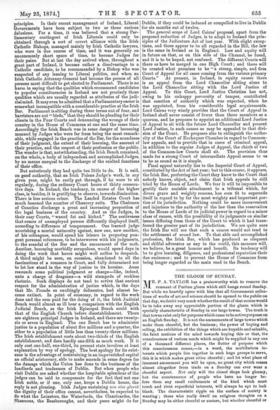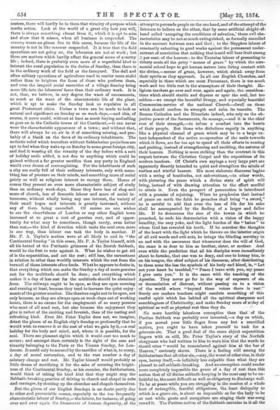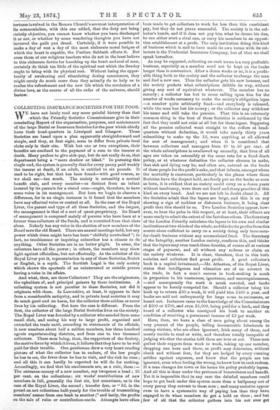THE GLOOM OF SUNDAY.
MR. P. A. TAYLOR has a praiseworthy wish to remove the remnant of Puritan gloom which still hangs round Sunday. But while we heartily agree with him that all Government collec- tions of works of art and science should be opened to the public on that day, we doubt very much whether the result of that course would be to take away any appreciable portion of the gloom which is specially characteristic of Sunday in our large towns. The truth is that towns exist only for purposes which cease to be active purposes on an English Sunday. It is not the amusements of large towns which make them cheerful, but the business ; the power of buying and selling, the exhibition of the things which are buyable and saleable, the faint motions of the mind towards buying this or that, the consciousness of various needs which might be supplied in any one of a thousand different places, the flutter of purpose which this consciousness rouses,—in a word, the multifarious in- terests which people live together in such huge groups to serve, this it is which makes great cities cheerful ; and let what place of innocent amusement you will be open, no great city which ceases almost altogether from trade on a Sunday can ever wear a cheerful aspect. Not only will the closed shops look gloomy, but the countenances of people who have no longer be- fore them any small excitements of the kind which most touch and rivet superficial interests, will always be apt to look blank. The characteristic ripple on the surface of society is wanting ; those who really dwell on religious thoughts on a Sunday may be either cheerful or austere, but whether cheerful or austere, there will hardly be in them that vivacity of purpose which marks action. Look at the world of a great city how you will, there is always something absent from it, which it is apt to miss and show that it mimes, when all business is suspended. The country wears no gloom due to this cause, because the life of the country in not in like manner suspended. It is true that the field operations are not going on, the labourers are not at work ; but these are matters which hardly affect the general scene of country life ; indeed, there is probably even more of a superficial kind to interest the rural population in the duties of Sunday, than there is in the ordinary work of the field or the farmyard. The dull and often solitary operations of agriculture tend to render more stolid rather than to brighten the faces of those who perform them, and even the languid social amenities of a village Sunday bring more life into the labourers' faces than their ordinary work. It is not, then, we believe, in any degree the want of amusements, so much as the want of the characteristic life of the place, which is apt to make the Sunday look so repulsive in all great Protestant cities. Unless a town can be made to look as natural and significant on Sunday as on week-days,--and this, of course, it never could, without at least as much buying and selling as goes on in the Catholic towns of the Continent,—it can never wear the characteristic appearance of a town ; and without that, there will always be an air in it of something missing, and pro- bably of a blank on the faces of its ordinary inhabitants. The mathetic relief which travellers without Sabbatarian prejudices are apt to feel when they wake up on Sunday in some great foreign city, and find it wearing all the vivacity of the day before with a sort of holiday smile added, is not due to anything which could be gained without a far greater sacrifice than any party in England would ever dream of contemplating. For the inhabitants of such a city are really full of their ordinary interests, only with some- thing less of pressure on their minds, and something more of social gaiety as well as religions interest to occupy them. Hence of course they present an even more characteristic subject of study than on ordinary week-days. Since they have less of shop and more of church, less of domestic labour and more of social in- tercourse, without wholly losing any one interest, the variety of their small hopes and interests is greatly increased, without any of them being cancelled. Of course no one wishes to see the cheerfulness of London or any other English town increased at so great a cost of genuine rest, and of oppor- tunity for what may be sometimes, though rarely, even better than rest,—the kind of devotion which tasks the soul even more in one way, than labour can task the body in another. If Mr. P. A. Taylor's motion were at all likely to end in "the Continental Sunday "in this sense, Mr. P. A. Taylor himself, with all his hatred of the Puritanic grimness of the Scotch Sabbath, would be the first to vote against it. What he wishes to get rid of is the superstition, and not the rest ; still less, the earnestness in relation to other than worldly interests which the rest from the turmoil of those interests often feeds. What he appears to desire is, that everything which can make the Sunday a day of more genuine rest for the multitude should be done ; and everything which makes it a day of less rest for the multitude should be abstained from. The railways ought to be open, as they are open morning and evening at least, because they tend to increase the quiet enjoy- ments of the greater number. The theatres ought not to be open, not only because, as they are always open on week-days out of working hours, there is no excuse for the employment of so many persons who most of all need rest, but also because the enjoyment they give is rather of the exciting and feverish, than of the resting and refreshing kind. Even Mr. Peter Taylor does not, we imagine, detest the gloom of an English city's Sunday so profoundly that he would wish to remove it at the coat of what we gain by it,—a real holiday for the body and mind, and, where it is possible, for the soul. There are pleasant sights which it would cost too much to secure ; and amongst them certainly is the sight of the ease and vivacity belonging to the Paris or the Vienna Sunday, for Lon- doners. It could only be secured by the sacrifice of what is, to many, a day of moral restoration, and to the vast number a day of salutary change and rest. Mr. Taylor himself would probably as little dream of sacrificing it for the sake of securing the bright- ness of the Continental Sunday, as his enemies, the Sabbatarians, would think of taking his kind hint that they might stop the Sabbath-breaking practice of driving to church and chapel in cabs and carriages, by shutting up the churches and chapels themselves.
But the gloom of our English Sundays is no doubt partly due to other and preventable causes, especially to the too frequently characteristic labour of Sunday,-,--the labour, for instance, of going over and over again the lineaments of human depravity, of the
attempt to persuade people on the one hand, and of the attempt of the listeners to believe on the other, that by some artificial sleight-of- hand called accepting the conditions of salvation,' those evil cha- racteristics may be not so much extinguished, as formally cancelled in the account between man and God ; to the Sisyphus labour of constantly exhorting to good works against the permanent under- current of conviction that nothing that is said will bear fruit among 1 per cent, of the hearers ; to the Tantalus labour of presenting to thirsty souls all the petty "means of grace" by which the cere- monial school hope to get human nature into living contact with the divine,—means of grace, however, which shrink away from their spirits as they approach. In all our English Churches, and especially in those which are most Protestant, there is too much work and too little rest in the atmosphere of their thought. Re- ligious teachers go over and over, again and again, the considera- tions which should startle and depress or spur the soul, but too seldom—we except the beautiful liturgy, and especially beautiful Communion-service of the national Church—dwell •on those which should confirm its strength and calm its tumults. The Roman Catholics and the Ritualists indeed, who rely on the ob- jective power of the Sacraments, do manage,—and it is the chief root of their strength,—to infuse a comfort into the hearts of their people. But those who disbelieve eagerly in anything like a physical channel of grace which may be to a large ex- tent independent of the active co-operation of the souls towards which it flows, are far too apt to spend all their efforts in rousing and probing, instead of strengthening and soothing, the natures of their hearers. Nothing is more striking than the contrast in this respect between the Christian Gospel and the expositions of its modern teachers. Of Christ's own sayings a very large part are apparently directly intended to quiet and strengthen the minds of restless and wistful hearers. His most elaborate discourse begins with a string of beatitudes, not exhortations,—in other words, with picturing the peace which a divine state of spirit will bring, instead of with drawing attention to the effort needful to attain it. Even the prospect of persecution is introduced with a promise of rejoicing. When he prophesies that instead of peace on earth the faith he preaches shall bring "a sword," he is careful to add that even the loss of life for his sake shall be accompanied by the finding of a larger and fuller life. If he denounces the sins of the towns in which he preached, he ends his denunciation with a vision of the happy humility, the easy yoke, and the light burden of the " babes " to whom God has revealed his truth. If he searches the thoughts of the heart with the light which he throws on the interior origin of all evil words and evil acts, he brings the blinding scrutiny to an end with the assurance that whosoever does the will of God, the same is as dear to him as brother, sister, or mother. And even while the prediction that all his disciples were immediately about to forsake, that one was to deny, and one to betray him, is on his tongue, the chief subject of his discourse, after distributing to them none the less the symbols of his body and blood, is, "Let not your heart be troubled," "Peace I leave with you, my peace I give unto you." It is the same with the teaching of the Apostles. They never go far in the way of exposure of sin or denunciation of distrust, without passing on to a vision of the world where "beyond these voices there is rest." Surely our modern teachers might emulate something of this restful spirit which lies behind all the spiritual sharpness and searchingness of Christianity, and make Sunday more of a day of spiritual as well as physical rest than they do.
No more horribly laborious conception than that of the Puritan Sabbath was probably ever invented,—a day on which, if you moved your little finger from any but a sanctified motive, you ought to have taken yourself to task for a grievous sin. That a good deal of the same abject superstition lingers with us still, Mr. Peter Taylor's story of the Norfolk clergyman who had written to him to warn him that the words he should utter "would be remembered against him at the bar of Heaven," curiously shows. There is a feeling still among the Sabbatarians that all other sin,—nay, the worst of other sins, in their eyes, heresy itself,—is infinitely less culpable than what they are pleased to call eabbath-breaking. And no conception could render more completely impossible the peace of a day of rest than this notion that of all duties eabbath-keeping is the most easy to be un- faithful to, the most difficult as well as obligatory to discharge well. To be at peace while you are struggling in the meshes of a whole host of untangible, fanciful obligations, the least disloyalty to which is a grave sin, is about as impossible as for the body to be at rest while gnats and mosquitoes are singing their war-song round it. The Puritan notion of the Sabbath contains in it all the
tortures involved in the Roman Church's severest interpretation of its ceremonialism, with this one added, that the duty not being strictly objective, you cannot know whether you have discharged it or not, or whether by some wandering thoughts you have not incurred the guilt you dread. Certainly, if it were possible to make a day of rest a day of the most elaborate moral fatigue of which the heart is capable, the Puritan Sabbath effects it. But even those of our religious teachers who do not in the least believe in this elaborate device for knocking up the heart and soul of man, certainly do think too little of the spiritual rest which the Sunday ought to bring with its physical rest. Without losing the oppor- tunity of awakening and stimulating dozing consciences, they might surely do much more than they actually do to help us to realise the refreshment and the new life which the revelation of a divine love, as the source of all the order of the universe, should bestow.




































 Previous page
Previous page